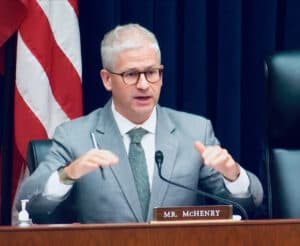 Congressman Patrick McHenry, the ranking member on the House Financial Services Committee, has sent a public letter to Congresswoman Maxine Waters, Chair of the House Financial Services Committee, requesting they work together to allow digital assets to “flourish.”
Congressman Patrick McHenry, the ranking member on the House Financial Services Committee, has sent a public letter to Congresswoman Maxine Waters, Chair of the House Financial Services Committee, requesting they work together to allow digital assets to “flourish.”
Both Representatives have recently issued public statements on central bank digital currencies, indicating an openness for digital asset innovation.
McHenry commended Chair Waters’ hearing from last month entitled “Digital Assets and the Future of Finance: Understanding the Challenges and Benefits of Financial Innovation in the United States.” He said:
“I appreciated the opportunity to work together and believe the hearing struck the right tone for members to better understand this nascent industry and the issues raised by digital assets.”
McHenry added:
“Digital assets hold great promise. Over the last several years, advanced technology has moved digital asset activities from the periphery to the mainstream. Digital assets have great potential to address wealth gaps in new and innovative ways. They have the potential to revolutionize our payment system. This is positive for all Americans. Recent interest by other Committees, the Department of Treasury, and other federal agencies only underscores this industry’s importance not only to the financial system but to the broader economy. Thus, neither this Committee’s nor Congress’ oversight and response should be ad hoc. There should be broad, bipartisan consensus among policymakers as to the appropriate policy solution on several important issues as outlined below.”
The Congressman said that both the Commodity Futures Trading Commission (CFTC) and Securities and Exchange Commission (SEC), under the leadership of Chairmen Benham and Gensler respectively, have been vocal about needed regulation but without authority based in statute. McHenry would like to see Congress take the lead on legislation that outlines what the regulators may, and may not do, when it comes to digital asset compliance.
McHenry told Waters that “we both understand that uncertainty in this industry will only hurt innovation. We must work together to create opportunities that allow these technologies to flourish without stifling them in their infancy. At the same time, we must ensure that both consumers and investors have the information they need to make good decisions. These are not decisions that should be made by regulators but by policymakers.”

